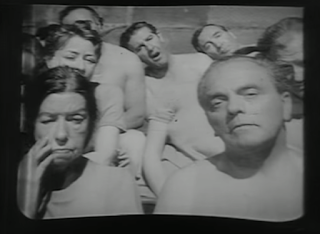** this review contains fairly mild spoilers **
First, this isn't spicy as the title suggests: it's a low-budget, British made-for-TV movie from 1968 (broadcast as part of Theatre 625). If you're still reading, it's very good, like a low-budget Brave New World mixed with the anti-TV agitation of Network, Max Headroom, and Idiocracy.
It seems only a black-and-white copy survives, but the YouTube presentation was acceptable (the title is also listed on amazon). The cast is excellent, including Leonard Rossiter (2001: A Space Odyssey, The Fall and Rise of Reginald Perrin) and an impossibly young Brian Cox. The standout, though, is Tony Vogel as Nat. With his burning, bugged eyes and combination of curiosity and idiocy, Nat seems of a future dystopia.
The script borders on brilliant, with intelligence and a good pace. There's some quietly effective future-slang: "so" is used roughly equivalent to "aloha," "king-style" means good, "super-king style," even better.
The story is from the point-of-view of the TV-producing elite, which saves on sets. What makes them elite? Mostly young, they're "high-drive," anti-intellectual and proud of it.
They share contempt for the "low-drive" majority, the idle proles watching the programs, and seen in surveillance footage (for purposes of ratings monitoring). Escapist television is essential to keep the masses passive: it's "apathy control," much preferred to the dreaded "tension," root of all evil. (Thank God it's just a story.)
The Sex Olympics is event-viewing targeting overpopulation: "Sex is not to do. Sex is to watch." (The surveillance shots are similar to those in Star Trek's inferior overpopulation-episode of 1969, "Mark of Gideon.") Viewers are fickle, though, and new ideas are welcome. Nat's restless, and inspired by a friend's transgressive paintings ("I want tension") he offers to leave comfort behind and (with two others) live like old-days "savages," as it's broadcast as a series (not called Survivor). Can any good come from going outside?
Inevitably, the film is dated in some aspects (some of the music), and may seem all too low-drive next to the overblown likes of The Hunger Games. It works though, as written by Nigel Kneale, creator of the TV/film character Professor Quatermass. The Year of the Sex Olympics remains disturbing, even as most of it has come true.
First, this isn't spicy as the title suggests: it's a low-budget, British made-for-TV movie from 1968 (broadcast as part of Theatre 625). If you're still reading, it's very good, like a low-budget Brave New World mixed with the anti-TV agitation of Network, Max Headroom, and Idiocracy.
It seems only a black-and-white copy survives, but the YouTube presentation was acceptable (the title is also listed on amazon). The cast is excellent, including Leonard Rossiter (2001: A Space Odyssey, The Fall and Rise of Reginald Perrin) and an impossibly young Brian Cox. The standout, though, is Tony Vogel as Nat. With his burning, bugged eyes and combination of curiosity and idiocy, Nat seems of a future dystopia.
 |
| Nat Mender (Tony Vogel) gets an idea |
The story is from the point-of-view of the TV-producing elite, which saves on sets. What makes them elite? Mostly young, they're "high-drive," anti-intellectual and proud of it.
 |
| Lasar Opie (Brian Cox) |
They share contempt for the "low-drive" majority, the idle proles watching the programs, and seen in surveillance footage (for purposes of ratings monitoring). Escapist television is essential to keep the masses passive: it's "apathy control," much preferred to the dreaded "tension," root of all evil. (Thank God it's just a story.)
 |
| the low-drives |
Inevitably, the film is dated in some aspects (some of the music), and may seem all too low-drive next to the overblown likes of The Hunger Games. It works though, as written by Nigel Kneale, creator of the TV/film character Professor Quatermass. The Year of the Sex Olympics remains disturbing, even as most of it has come true.



